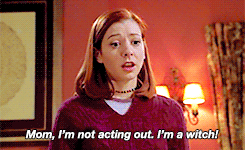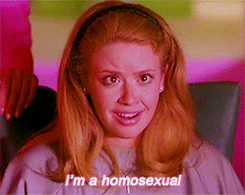FP Staff Picks: Teens of the 90s
A portrait of a young girl in the glorious wasteland of 1990s Los Angeles, Fade Into You recalls the hormonal haze and urgency of adolescence.
High school junior Nikki Darling alternates between cutting class and getting high, flirting with drugs, crushes, and counterculture to figure out how she fits into the world. Running increasingly wild with other angst-ridden outcasts, she pushes herself to the edge only to find herself trapped in the cyclical violence of growing up female.
To celebrate FADE INTO YOU, the FP brain trust set the Wayback machine and generated this epic list of our favorite fictional teens of the 90s. You’re welcome.
TV: My So-Called Life
What: Winnie Holzman's drama about high-school life, told mainly by 15-year-old Angela Chase (Claire Danes), is FULL. OF. TEEN. ANGST. While it was canceled after one season, there are nineteen great episodes about Angela dealing with the classic teen struggles: highs and lows with friends, weird parents, the stress of school, and being in love with an illiterate hottie.
Why: Instead of having an after-school special vibe, My So-Called Life addressed big issues in a serialized way. I also love how the "adults' and teens often faced similar issues with similar results, showing young viewers that no one really has their stuff together. Where's the reboot Netflix?
—Lucia, External Relations Manager
Movie: Girls Town
What: A group of high school seniors grapple with the heart-wrenching discovery that their friend Nikki committed suicide after being sexually assaulted. After confronting invisibility and gaslighting in a sexist community, they decide to chase justice on their own terms.
Why: I watched Girls Town on repeat in the aftermath of the Kavanaugh hearings to remind me about the power of friendship and solidarity in the face of adversity.
—Jamia, Executive Director and Publisher
TV: Ghostwriter
What: This PBS mystery series features a group of Brooklyn middle-schoolers who solve neighborhood crimes with the help of an invisible, highly literate ghost who communicates by manipulating printed text.
Why: At the time it aired (1992-1995), I loved this good-hearted show because its heroes were young nerds like myself. Looking back, I also appreciate the race and gender diversity of the cast and the repeated lessons, however clunky, about the power of collaboration and the importance of print media. Ghostwriter taught me to always head to the dictionary if I encounter an unfamiliar word—a crucial life lesson that's served me well!
—Sophia, Development Manager
TV: Buffy the Vampire Slayer
Who: Willow Rosenberg, the smartypants of the Scooby Gang on Buffy. We all know that Buffy is smart and strong, but Willow was an absolute necessity to Buffy's growth as the Slayer and the destruction of evil demons and baddies in Sunnydale. As we learned more about the Hellmouth and the various demon dimensions with the monster-of-the-week format, Willow learned more about magic and herself.
Why: Willow's journey from meek geek to all-powerful witch was a hugely powerful metaphor on the show. Willow begins to understand herself more when she starts experimenting with magic, akin to accessing her inner power. Her sexuality is also tied up with the deep magics and wiccan rituals. Here's hoping the reboot brings us a nerd character as hilarious and empowering as Willow.
—Julia, Fall Intern
Movie: Edward Scissorhands
What: Classic Tim Burton film featuring Winona Ryder and Johnny Depp, Edward Scissorhands is a dark romantic comedy about a synthetic young man who, as a result of his inventor's untimely death, has shears instead of hands.
Why: The movie is timeless in its portrayal of a gentle-souled outsider who sparks fear and violence simply for being different. And who doesn't love a misunderstood hero?
—Lauren, Senior Editor
TV: Moesha
What: Moesha Mitchell lives with her family in a neighborhood outside of Los Angeles, California. Created by Ralph Farquhar, this show addressed teen pregnancy, drug use, race relations, the death of a parent and the day-to-day issues teenagers face at home and in school.
Why: Moesha was an honest and authentically 90s portrayal of being a Black girl that was not grounded and based off stereotypes. I loved how it captured and showed the angst of being a young Black girl in a suburban community; it was the first show of its kind that I watched to do that.
—Halle, Fall Intern
Movie: But I’m A Cheerleader
What: Natasha Lyonne stars in this cult classic as a a high school cheerleader sent to an inpatient conversation therapy center to “cure her of her lesbianism.” A campy rom-com with an over-the-top, satirical depiction of the horrors of gay conversion therapy.
Why: What's not to love: RuPaul as a dubiously "ex-gay" counselor, explicit mockery of gender roles, an epic rescue, and a victorious queer love story. Autostraddle agrees.
—Hannah, Outreach and Operations Manager
Movie: Just Another Girl on the I.R.T
What: Written and directed by Leslie Harris, Just Another Girl on the IRT is a poignant depiction of one feisty, fun loving, college bound, 'round the way, 17-year-old girl, Chantel Mitchell (Ariyan A. Johnson) who seems to know it all, until she finds herself pregnant.
Why: The Hood Film genre that emerged in the 90s was widely praised for its raw depictions of Black and brown men's experiences in urban settings. Just Another Girl was the first (of very few) to add to the genre, but from a Black feminine lens, an often overlooked and forgotten narrative. Chantel Mitchell is the OG Carefree Black Girl, even with the weight of the world on her shoulders.
—Bry’onna, Fall Intern
TV: Twin Peaks
What: "Who killed Laura Palmer?" was the question at the center of Twin Peaks, a murder mystery cult classic about the eerie secrets hidden within a sleepy town in the Pacific Northwest. Cancelled after only two seasons (but revived recently for a limited run in 2017!), the show is known as one of TV's all-time greatest, and features an unforgettable cast of quirky, eccentric characters.
Why: Twin Peaks was a staple of early 90s popular culture, and set the tone for many atmospheric mysteries to follow (think Top of the Lake, The Killing, and even Riverdale). At the heart of the show is the unforgettable group of teenagers who find friendship, romance, and rivalry after the death of their classmate, Laura Palmer, and discover complex and varied ways to deal with their grief, fear, and anguish.










